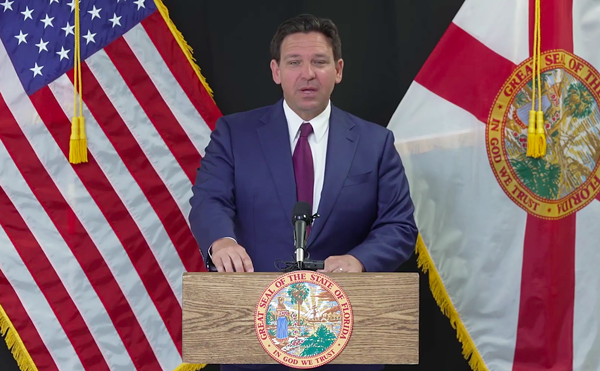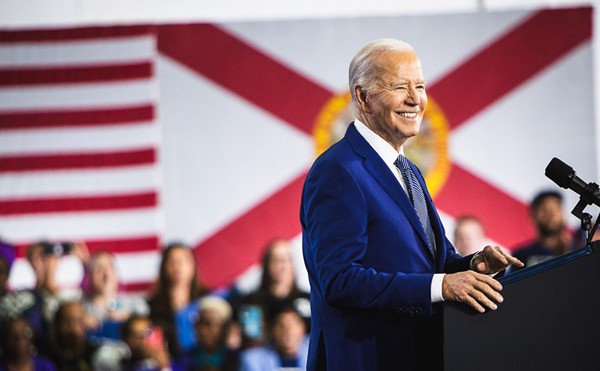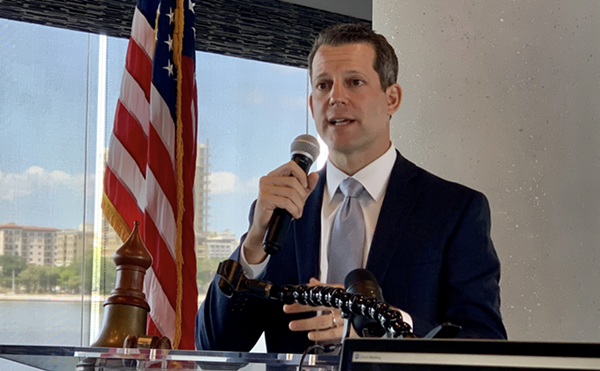The bowl’s future has been up in the air due to the city’s plan for redesigning Perry Harvey Sr. Park, with the plan originally being to replace it with an outdoor stage to represent the area’s historical importance to the Tampa African-American community.
A large audience was present for the meeting, both for and against keeping the Bowl. Most represented was the Tampa skateboarding community, coming out for both sides of the debate.
The plan presented by those responsible for the redesign doesn’t discount the importance of skating in Tampa’s culture; a larger, more modern park was to be built in another area of the park to replace it.
Debate was passionate, but polite. Shannon Bruffet, the founder of the Skateboard Heritage Foundation and the main leader of the effort to save the park, sees it as a piece of cultural heritage for all of Tampa.
“One of the things that's closest to my heart is skateboarding and being part of Tampa," Bruffet said. "I’ve seen how Tampa has enjoyed the bro bowl. It’s played an integral role in the development of the culture.”
Bruffet focused on the historical impact of the bowl, stressing that it’s a living part of skate boarding’s history.
“Skate culture is still relatively new, since it’s inception in the sixties it’s evolved consistently…the Bro Bowl reflects a part of that culture. It’s not so much the purpose of it, whether or not it’s a modern facility, it’s more of a monument and a reflection of a time gone by.”
Frank Hearns, the former director of Tampa’s Department of Community Affairs, discussed the importance of the redesign, stressing the African-American history of the area.
“The plan is to make a new skate program and add a walk of fame for black leaders.”
Hearns went on to describe the importance of the park to the black community, namely its founding in wake of the 1967 race riots and it’s storied history as an area.
“It’s where most of the slaves settled in 1864 after they were freed.”
A large section of Bro Bowl skaters expressed their love for the park, but felt it was time to move on. To many of them the layout of the park is outdated and only represents one style of skating.
Brian Schaefer, the owner of the Skate Park of Tampa, expressed his desire for a more modern, free park. He says that as a private business an improved public park would add some competition for him, but he sees that as a good thing.
“It would threaten our business in some regards, but competition is good…more skateboarders will have the opportunity to see what skate boarding’s about and be exposed to a free, safe, more improved (and a park with) more levels to utilize.”
Schaefer went on to express that he understands the love for the site, but that a new park would benefit both young and old skaters greatly.
“I’m so compassionate about the Bowl because I learned to skate there. Everybody did.”
The committee held a relatively short discussion on whether to nominate for the registry or not. The decision was a particularly challenging one, as most historical places on the registry are over fifty years old. There was also some debate over the fact that if the bowl was to be re-poured whether it would still carry its significance.
Committee member Kevin Sutton was supportive of the push to deem the Bowl historic. Sutton cast aside the thought that re-pouring the concrete would take away from the site’s legitimacy, noting that most of Tampa’s historic properties have had some kind of reconstruction done to them over time.
“I really don’t believe that the matter of 'what is its current condition?' really matter in this discussion. What’s really much more important is it’s presence within this community.”
Following the vote there was a large, yet mixed reaction from those in the audience. Some were ecstatic about the recognition of a Tampa landmark; others thought it was a step back for progress in the Tampa skate culture.
Being added to the registry doesn't act as a complete deterrent to demolishing the park, but its new found status gives it a much more prominent status in the community.
Schaefer from SPOT talked to CL after the meeting about the outcome and how it affects the creation of a new free park.
“It completely changes the dynamics of the simplicity of that park being built the way it is, because by working around an existing structure now the funds and the grants for the new location have to be divided. It’s yet to be determined how that’s going to be defined and utilized.”
He also feels that the current layout won’t do as much to energize new skaters as much as the proposed park would have.
“The only positive about this is that there’s still skateboarding and it’s free, as it should be.” Schafer said. “The negative is it will be underutilized, the community won’t be exposed to skateboarding and the communities outside it as it sits with only three to ten participants a day.”
After the meeting there were a few skaters at the Bro Bowl, enjoying the summer day. One of the skaters, thirteen year old Jose Vega, was joyous when told about the outcome of the meeting.
Vega has been skating since he was eight, and the Bro Bowl is his favorite place in town.
“Everybody loves the bowl, they named it the Bro Bowl because everybody comes here to chill…there’s something called Sunday Funday, everybody comes, they grill.”
He says he doesn't want a new park.
“We gotta keep the bowl, because where are we going to go in the meantime?”
Vega also likes the variety of people who come to the park, saying he’s even hung out with X-Games participants who wanted to see it.
“Before you came there was a guy said he’s come here since he was eight years old, he’s now like 48.” Vega also says he likes the sense of community between everyone who comes. “Everybody respects around here.”
















